#star trek picard meta
Explore tagged Tumblr posts
Text
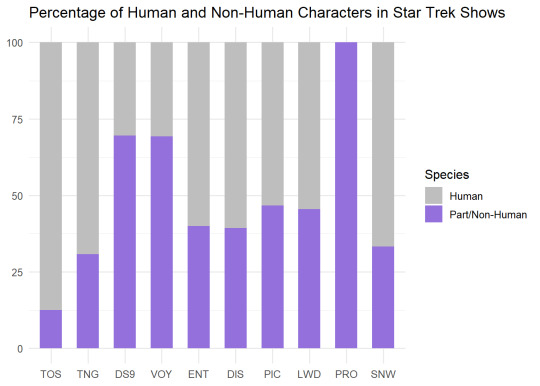
I was curious about which Star Trek shows had the most human vs non-human characters, so I made this graph. I counted all major characters plus characters who were in at least 10 episodes of each respective show (with a few exceptions for incredibly minor characters who are technically in more than ten episodes but have barely any/no lines). A full list of characters included is below the cut.
TOS:
Part/Non-Human: Spock
Human: Kirk, Mccoy, Scotty, Uhura, Sulu, Chekov, Chapel
TNG:
Part/Non-Human: Data, Troi, Worf, Guinan
Human: Picard, Riker, La Forge, Crusher, Wesley, Yar, Pulaski, O’Brien, Ogawa
DS9:
Part/Non-Human: Kira, Odo, Quark, Jadzia, Rom, Nog, Garak, Dukat, Worf, Weyoun, Martok, Leeta, Ezri, Damar, Female Changeling, Winn
Human: Sisko, Bashir, Jake, O’Brien, Keiko, Kasidy, Ross
VOY:
Part/Non-Human: Torres, Neelix, EMH, Tuvok, Kes, Seven (part Borg counts as not entirely human to me), Seska, Naomi, Icheb
Human: Janeway, Chakotay, Paris, Kim
ENT:
Part/Non-Human: T’Pol, Phlox, Soval, Shran
Human: Archer, Reed, Tucker, Sato, Mayweather, Forrest
DIS:
Part/Non-Human: Saru, Tyler (debatable but I’m counting him as partly non-human), L’Rell, Book, T’Rina, Nhan, Rillak, Linus, Zora, Adira (again, debatable, but they’ve got a symbiont so they’re not entirely human to me), Gray
Human: Burnham, Stamets (complicated case but I counted him as still human), Tilly, Culber, Lorca (mirror universe characters are still human, I think), Georgiou, Detmer, Owosekun, Rhys, Bryce, Cornwell, Airiam (she’s still human), Pike, Jett, Nilsson, Pollard, Vance
PIC:
Part/Non-Human: Picard (for part of the show at least), Elnor, Soji, Narek, Seven, Laris/Talinn (I am just pretending they’re the same character for simplicity), Jack (I guess???)
Human: Musiker, Jurati, Rios, Adam, Riker, Crusher, Shaw, Sidney
LWD:
Part/Non-Human: Tendi, Shaxs, T’Ana, Barnes, Kayshon
Human: Mariner, Boimler, Rutherford, Freeman, Ransom, Billups
PRO:
Part/Non-Human: Dal, Gwyn, Zero, Rok-Tahk, Jankom, Murf, Hologram Janeway, Diviner, Drednok
SNW:
Part/Non-Human: Spock, Una, Hemmer
Human: Pike, La’an, Uhura, Chapel, M’Benga, Ortegas
#star trek#star trek tos#star trek tng#star trek ds9#star trek voy#star trek enterprise#star trek discovery#star trek picard#star trek lower decks#star trek prodigy#star trek snw#lane posts#lane's misc meta
946 notes
·
View notes
Text
There's also the Romulan Rescue and subsequent Attack on Mars to consider.
While it's never explored in detail in alpha canon, we still see that a considerable amount of the ship-building operations on Mars, Starfleet's largest shipyard, if I'm not mistaken, had been dedicated to the Wallenberg class transports to aid in the refugee mission. The Federation committed a large part of Starfleet to this effort and many of their ships would have been modified and tied up in it, and new ones would have been built with an eye towards this purpose.
And then, the largest ship-building operation Starfleet had gets wiped out in its entirety, along with a good chunk of the resche armada. They have other shipyards, of course, but if they looked anything like Mars, they would have heavily incorporated synth labour at this point - except then synths got banned and they had to (and might have wanted to) decommission theirs.
So, 15-ish years before the start of season 1, there was a big upheaval in the Federations ship-building operations, after they had already undergone a large-scale change at the start of the Romulan Rescue Mission. And it was triggered by a large-scale attack that nobody claimed credit for, so Starfleet didn't know if it was "just" malfunctioning tech or s targeted strike (we see a bunch of speculation about this in season 1).
In that climate of uncertainty, paranoia, and pain, when they already had to re-think how they were building ships and re-build a good chunk of their fleet with much fewer available resources and drastically reduced manpower, settling on a couple classes of ships that can be built quickly, efficiently, and used in exactly the way OP outlines above seems entirely within reason.
I know the copy-paste fleet from PIC's Et in Arcadia Ego, Pt. II tends to get a lot of people riled up, but honestly, I feel like it makes a lot of sense from an in-universe perspective.
Like, one of the big issues Starfleet had in the TNG and DS9 eras was that basically any time a new threat rolled up at the border, their threat response was just whichever ships they could call up at short notice. This was one of the bigger reasons why the fleets in episodes like The Best of Both Worlds, Redemption, Pt. II, and the Descent two parter were a mish-mash of different classes: from Starfleet's perspective, it was quite literally just whoever they could drum up in the moment, not which ships were actually best for this job.
During the DS9 era, there was a shift from fleets being just whoever they could drum up to being actual formalised big fleets that consistently did maneuvers together. This is why it went from DS9 getting seven ships as reinforcements during the battle in The Way of the Warrior to there just being hundreds of ships that operated together a few seasons later. This is apparently a trend that continued after the Dominion War, too: in Nemesis, the fleet the Enterprise-E was supposed to link up with towards the end was referred to as Battle Group Omega.
I think having a couple hundred Inquiry-class ships operating as a single fleet would make sense in this context. A lot of the ships that were in service during the TNG/DS9 era would have been decommissioned or destroyed by this point, and Starfleet would have had to replace them with something. In seasons two and three of Picard, we've seen some of the other ships that have been introduced over the intervening decades; having a few rapid response units would also make sense.
This wouldn't necessarily square with Starfleet's exploratory and scientific missions, but I don't think it'd necessarily need to. Even in TNG, there were more military-focused officers like Captain Jellico and Admiral Nechayev who were very concerned with the Federation's security, and they didn't get in the way of the Enterprise-D's exploratory, scientific, or diplomatic missions.
The same would be true of the late 24th/early 25th century of PIC's first season: they could easily have both the heavily militaristic officers and the more pacifist officers working different missions for the most part. It's just that the part of the fleet we saw was the military part.
Plus, from a thematic point of view, this would tie into why Picard left Starfleet to begin with. In Remembrance, Picard straight up says he left because he felt that Starfleet wasn't Starfleet anymore. Having a noticeable chunk of the fleet set up to be the immediate military response to a new threat would make sense in that context. Picard's traditionally been the kind of guy who prefers peace and diplomacy (though he is a capable military guy when the chips are down), so Starfleet immediately being able, and potentially willing, to respond to everything with deadly force really would rub him the wrong way.
The other reason I don't mind there being a fleet of hundreds of Inquiry-class ships ready to go is because of the makeup of the Romulan, Klingon, and Cardassian fleets during DS9. While these powers did have some varieties in their fleets, for the most part they're just as guilty of flying copy-paste fleets as Riker was in Et in Arcadia Ego, Pt. II. While Starfleet was flying fleets with a large variety of ship classes, the Romulans were almost exclusively flying D'deridex-class warbirds, the Klingons mostly Vor'cha- and Negh'var-class battle cruisers with the occasional bird-of-prey and K'tinga-class, and the Cardassians exclusively Galor- and Keldon-class ships.
This doesn't necessarily mean that these are the only ships these powers had available, but they were very much the backbone of their battle fleets and were clearly considered to be the most capable of combat. Their other ships were probably made for much more specialised purposes.
This is probably a design philosophy Starfleet probably took as well. Instead of having most of their larger ships be jack-of-all-trade ships, they spent more time having specialised ships for specialised purposes. The end result of this is that they could have 200 Inquiry-class ships ready to go for this purpose rather than just have dozens of different classes that might not be the best for it, but would do in a pinch.
I feel like this is also something people would have warmed to a lot more over time, had the Picard writers not immediately try to back peddle in season two's opening episode, The Star Gazer. Had they just said, "Well, this is a new era, both of production and in-universe, and this is how Starfleet does battle fleets now," it might still be a contentious thing but people would eventually get used to it.
The other thing they probably should have done--and I still think they should do this at some point--is have a show set during this same period that focuses heavily on a five-year mission during this period. That'd allow room for an explanation that the copy-paste Inquiry fleets are mostly just for emergencies, and that other ship classes exist for different purposes. (I know eventually someone will say, "Yeah, but Lower Decks and Prodigy exist", but keep in mind they're set twenty-ish years prior to Picard.)
I think this would allow for starship classes to clearly be for much more set purposes rather than just be the jack-of-all-trade ships they've traditionally been. While there's been exceptions to this like the Oberth- and Nova-classes mostly being science vessels, the Defiant-class being a warship in all but name, and the Olympic-class being a medical ship, but these are mostly the exceptions.
Classes like the Constitution- and Excelsior-classes are nominally explorer classes, but have been shown to be used for military missions as well for example, and that tends to be the general rule for larger ships. For the most part, if they're a medium-to-large ship for the era, then they're used as a jack-of-all-trades ship rather than for a specialised purpose.
So really, the writers on Picard had the opportunity to really do something interesting with how starship classes get used and having a set canonical purpose for each new class, but then they chose to not do it because it didn't really gel with a lot of people. I feel like this is ultimately an unfortunate thing.
#canon is a sport and i'm winning#or in this case op is very much winning#that is some *mighty* fine canon-wrangling there op!#my personal explanation for the 'copy-paste' fleet is:#the post-production schedules for shows like this are already tight and then while they were working on this episode#we entered into a fucking global pandemic#and whining about the ship models not being original enogh instead of being in awe that this season got finished and aired on time at all#is missing the point by about a mile#i understand griping at writing and production decisions and quibbling about in-universe reasons for things#i do it all the time#but this is such a minor issue and has been blown so itterly out of proportion and i think that's a shame#and as you can see there are perfectly good explanations for all of it. just listen to op 😁#star trek picard#star trek picard season 1#star trek picard meta#starships#attack on mars#long post
37 notes
·
View notes
Text
THERE MIGHT BE KAHLUA IN THAT NEBULA: A Star Trek Fandom Drinking Game
Booze: the final frontier. Fandom conventions: the final, final frontier, once you're past the original point of no return.
Whether you're cosplaying at a con, chillaxing on your couch, or doing a watch party online with your virtual shipmates - THESE ARE THE VOYAGES… of you, running frantically to the restroom, humbly bowing before the almighty porcelain god, and paying your penance to the Guardian of Foreverclear.
Your mission is to seek out strange new life by looking in the mirror because you, my friend, are a goddamn nerd who's been playing a Star Trek drinking game. And although you've probably been here MANY times before - if you can't remember it, we can just wink and say you're boldly going where no one has gone before.
ATTENTION BAJORAN TWERKERS: These are the rules.
1) Grab a cup, flask, bottle, mug, or biohazard container full of your favorite intoxicant (or juice or soda if you wanna play but don't do the booze thing. Hell, drink water if you want. Somebody's gotta stay sober to remind the drunk-ass fools of all the embarrassing shit they did in the morning.)
2) Plop your ass in front of a Trek episode if you're gonna do Part I, or go prowl a convention or fandom event if you're gonna do Part II. (If you're doing part II, disclaimer applies: please don't get caught if you break any convention policies related to alcohol.)
3) Drink as instructed. May the Force be with you and may the odds be ever in your flavor…er…favor, because you're gonna need the strength of a few other fandoms' catchphrases to get through all this goofy shit. (Seriously though, please DO make sure you live long and prosper. If you've hit your limit, switch to water.)
------ THIS GAME IS WRITTEN FOR ENTERTAINMENT PURPOSES ONLY. NO ONE IS ACTUALLY ENCOURAGED TO CHUG THEMSELVES INTO OBLIVION. VOID WHERE PROHIBITED BY LAW OR BY OUTLAWS ON FENRIS AND/OR FREECLOUD. THIS PAGE MAY NOT BE REDEEMED FOR CASH, CREDITS, DILITHIUM, OR LATINUM. IF YOU'RE STILL READING THIS CRAP, YOU MAY NOT BE REDEEMED EITHER. MANAGEMENT IS NOT RESPONSIBLE FOR ANY UNEXPECTED WORMHOLES, TRIBBLES, LIZARD BABIES, OR REGRETTABLE LIFE DECISIONS. -----
#star trek potluck#Star trek potluck 2024#startrekpotluck2024#Star trek memes#Star trek shitposting#Drinking game#Star trek voyager#Star trek picard#Star trek tng#star trek ds9#star trek prodigy#Star trek some other stuff I'm too incoherent to remember#Star trek Meta
35 notes
·
View notes
Text

#I'm calling it#Archer is a son of Zeus#Pike is a son of Apollo#Picard is a son of Athena#Janeway is a daughter of Hermes#Sisko is a son of Mars#And Kirk#obviously#we all know#Is a son of Aphrodite!#my meme#percy jackson memes#percy jackson#percy jackson meta#percy jackson and the olympians#captain archer#captain pike#captain kirk#captain picard#captain janeway#captain sisko#zeus pjo#apollo pjo#athena pjo#hermes pjo#mars pjo#aphrodite pjo#star trek#star trek memes#canonically thirsty kirk
37 notes
·
View notes
Text


This is the worst way to find out I have a favorite kind of character and it is one that is loyal to his people no matter how much others might fear them, being a father and a protector of them, and then dying tragically even as they try to help and protect those they care about.
Brb crying
for the trop girlies (gn) unfamiliar with him - the other character is Hugh from Star Trek and he (spoilers for Star Trek Picard):
got taken by the borg and was modified against his will thereby losing his sense of self while forced to serve them (and needed others to regain his sense of self and empathy)
his name as a borg was Third of Five, but after gaining his freedom he was given a new name, Hugh, which he goes by
became a guardian of the freed former borg (xBs) helping them to heal from their trauma and get better while trying to protect them from those who feared them or wished to exploit them - against a whole galaxy of ppl who saw all borg or former borg as dangerous
him and his people also have no 'home' of their own
ended up getting killed while trying to help his friends and while being unable to protect the very xBs he had devoted himself to
also. facial scars due to experimentation/modification. dark hair. dark clothes. goth vibes but dark does not mean evil.
...does this remind you of anyone?
#this makes sense for like me and 2 other ppl i am afraid but i DO NOT CARE it has to be said#also I am still not over hugh and never will be *gross sobbing*#him and adar have so many parallels and i will NOT change my mind on this#not mentioned in this post is that hugh *definitely* got killed off too early and would have been awesome in later seasons of PIC#because trop technically still has a chance to do something awesome here (i am swimming in the river of denial pls leave me alone)#someone give hugh and adar each their own spin-off series pls#adar#adar trop#adar the rings of power#hugh#hugh of borg#hugh borg#pic#star trek picard#the rings of power#trop#spoilers#trop spoilers#the rings of power spoilers#textpost#meta#mine
20 notes
·
View notes
Text
I know this is an older post but so. much. this. I also wonder about that, and personally think the series would have profited much more from including the character more, leaving him alive and an active part of the series, than...the route they chose to go with (which seemingly wasn’t popular with fans either).
Considering JDA mentioned (jokingly and maybe not jokingly?) multiple times in different contexts that he’d love a spin-off including/about Hugh (a prequel to Picard for example)...he would at least not be *opposed* to returning to Trek, or even to have Hugh’s fate be corrected, it seems like. Make of that what you will.
(Here’s to me hoping that maybe, there will be some special or spinoff or retcon or whatever, since there are so many ways he could have survived, and I think the fans would be open to that as well.)










the cutest of borg + text posts (part one)
#st picard meta#star trek picard meta#meta#st picard#star trek picard#picard#hugh#hugh borg#jonathan del arco#textpost#textposts#humor#funny#incorrect st picard#incorrect picard#incorrect star trek picard#star trek tng#(oops this was originally a humorous post but meta and such always draws me in)
119 notes
·
View notes
Text
THROUGH LINE
I've heard that writers will often link separate stories like in a trilogy, for example, with some kind of connector or through line, I think it's called.
There's reason to believe that Q is the through line in all three seasons of Picard. He is subtly woven through the series, from start to finish.
Season 1: Episode 1

Data draws the Q cards--either because Q inserted himself into Picard's dream. Or Picard dreamt of Q on his own. But, it involved Data.
Season 1: Episode 10 Pt 2

We have a butterfly/moth guiding Picard's soul to his android body after Irumodic Syndrome had finally taken its toll on his body.
Q has a butterfly motif in his dialogue in Season 2, doesn't he?
"I am the flutter of a butterfly.."
"...your griefs, your pains. You're like butterflies with your wings pinned..."
(I challenge you to listen VERY carefully when Data shows the Q cards. I can hear the sound of something flitting--like, butterfly wings beating hard. Not joking, I swear. It's very quick.)
Where does Q lead Picard to?
The sitting room in his own chateau, but with everything a monochromatic beige. The clock on the mantle has no hands. Hence, Time doesn't matter. The room is bland, with no character. It has no meaning, really.
Even the ceiling of the room is nothing but stars.
The sitting room is a fabrication.
Data is there, waiting for him. He even tells Picard that they're in a "quantum simulation", a stage of sorts, courtesy of a few red computer chips.
But, Data seems to know a lot about his "circumstances" for someone, who's been by himself. Has he had any visitors (of the omnipotent variety, lately?) Or has someone perhaps, helped in the creation of Data's "world"
all for the purpose
of *helping Picard to let go of the persistent feelings of guilt he has been carrying around with him since the day when Data sacrificed himself in Nemesis to save him?*
Picard didn't want to let go, to "unshackle" himself from the past with Data's death in the first episode, didn't he?

"I don't want the game to end."
But, here he does let go.

Picard was able to let go of Data at last, and Data literally disolved into dust.
Kinda like this?

And courtesy of the brilliant and spot-on analysis by @celestialholz ,showing how Q is represented by the Sun (which is canonically confirmed in the post-credits scene of the final episode of Picard:Season 3, btw), you can see how dark Picard's sitting room is while he's talking to Data:

And now look, as Picard lets Data go:

The Sun is shining brightly.
Q had to be involved.
Through line.
Check this out, too. In the Sitting Room/Data Goodbye scene, notice that the camera focuses--not once, but TWICE at a few **specific** artifacts in the room.
The sculptures of the Hindu gods on Picard's table:


It's rather interesting that these Hindu artifacts would capture the attention of the camera more than once during this scene.
After all, the other objects in the room are tucked away in the background behind Data and Picard, with no color to them, no prominence. They're just filler.
But, what is so special about these figures?
Honestly, it's hard to say.
However, they are in the last episode of Season 1, and I'm proposing that Q was a "through line" from start to finish in Picard's story.
What is Q wearing in THE final scene of Season 3?

As @celestialholz explained, Q is wearing a silver eight-pointed star with nine rubies in it, the largest, representing the Sun, in the center.
It's akin to the "navaratna", which in Hinduism, is where each of the nine planets is represented by a specific jewel, and they surround the Sun.
The navaratna shows the relationship between the Sun and the planets. Eternally bound.
Here is the link to the analysis by @celestialholz explaining the navaratna in more detail:
What I would like to also offer at the altar of Qcard fandom is that it should be noted that a true navaratna doesn't have just one kind of stone, which in Q's case, is the ruby.
I lean into the thought that while Picard's birth planet, according to Vedic astrology, is the Moon, which is actually represented by the Pearl, his birth month, July , which is Cancer, (Jean-Luc Picard/Patrick Stewart), has the Ruby as its birthstone.
9 rubies= 9 Cancer birth stones all circling the Sun (Q).
An eternal relationship between Q and Picard.
*****
Again, while this whole series was a convoluted and painfully messy shitshow, there were people including, the writers and costumers, who deliberately included these subtle hints and details into the very images we saw, but didn't take notice of in our casual viewing, and into the dialogue, which, unless we paid very precise attention to, missed during our attempts to understand the story.
Q was there all along in Picard's story, from the very start to the very end, and it was planned that way.
Q helped Picard accept his loss of Data in Season 1, helped Picard get past his trauma in Season 2, and as for Season 3, Q was connected to the previous two seasons by way of his "miraculous" reappearance, resurrection, whatever (I have another theory on that, as well), and the subtle nod to Hinduism by way of his costume in the final scene.
I think certain people (Pat Stew, JDL, Cindy Apfel, Imario Susilo et al) wanted Q's story with Picard to continue, despite the decision to have Q "die."
Perhaps, certain higher ups in directorial positions didn't approve of even a Qcard kiss, let alone an on-screen union
but others wanted it, regardless.
Patrick Stewart and John de Lancie, for a good example, have tried to push for Q and Picard to do more ( Tapestry kiss, anyone?), but for seven years, we got a whole ton of dialogue and ear whispers on-screen, and canon confirmations from the actors and even Ron D. Moore.
Honestly, what is it about Qcard that we can't even get a Lower Decks canon-fest, like Garashir????
I'm dreaming of a Qcard wedding for Pete's sake.
So, in STP, they had to default to the safe route, once again.
They gave us more Qcard--but had to do it in a very subtle way.
So, for what it's worth, Q connects the three stories of Picard.
He is Picard's constant.
Q is and has always been there for Picard, all the time. He always will be.
Abiding with him, guiding him, and loving him all the way.
#qcard#star trek q#john de lancie#patrick stewart#star trek#q#jean luc picard#q and picard#stp#q x jean luc picard#meta analysis#truth hidden in plain sight
12 notes
·
View notes
Text
One of RWBY's themes, especially in the later volumes, is how stifling and painful being expected to act perfect all the time really is.
So naturally, the fandom holds its characters to absolutely high standards and flip when they aren't 100% absolutely golden, or woobyfy them to such a degree that they can't see any of the flaws they're supposed to have.

53 notes
·
View notes
Text
Okay so, since 2009 most of Star Trek has had this swirly blue tunnel warp speed effect . . .

. . . seen here on the U.S.S. Titan in Picard season 3. Now, a few episodes later the gang pile into their old Next Gen ship and . . .

It's the 90's Trek "streaking stars" warp effect!
I always assumed it was just different visual effects for the exact same thing, a real-life artistic choice, and now I'm wondering if different ships with different engines are supposed to make different warp effects in-universe. Or maybe it's just nostalgia overload and I'm overthinking things as usual.
#star trek#picard spoilers#star trek picard#star trek meta#warp speed#star trek tech#uss titan#enterprise d#the next generation#star trek tng#deep lore
157 notes
·
View notes
Text
One of the weirdest things about NuTrek is that they seem to have forgotten that enlisted people exist in starfleet. Like everyone on those shows is an officer. Its like they can't conceive of anything existing below ensign.
27 notes
·
View notes
Text
If there's one thing Voyager is really good at -- is making TV movies aka their two-three parters (I consider Scorpion 1 and 2, and The Gift a trilogy).
But also, aside from Year of Hell, I think Dark Frontier is also a great TV movie-style event.
It might be the first time Seven actively denied she was Borg.
I know I've screencapped this scene before but I want to do it again because the scene is so good, so crunchy.
In the scene after the Borg Queen orders Seven to assist with the assimilation effort-- Seven kind of follows along in a daze, almost automatically goes along with things like a good drone:

It's only when Seven registers that people are yelling around her that she stops:
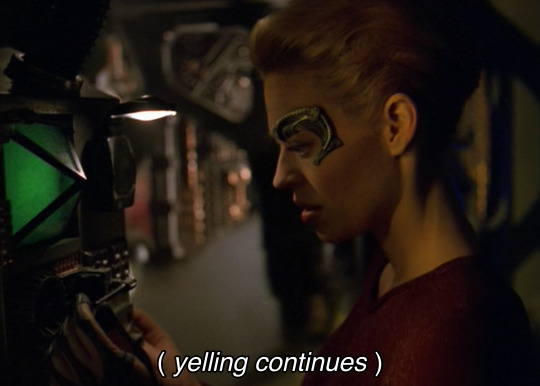
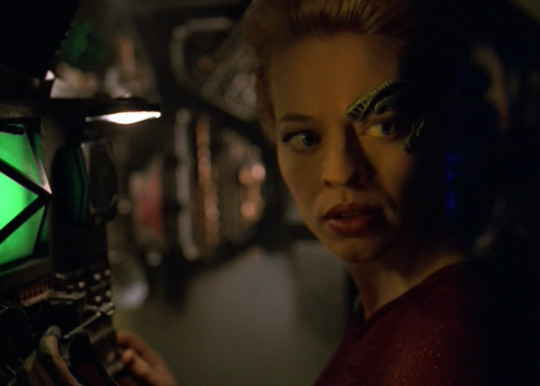
People yelling for mercy in a Borg Cube must have been background noise for Drone!Seven.
The moment that Seven post-severance realizes what the yelling actually means, Seven is perturbed. Especially when she can see people being ushered to their assimilation. Blank-faced and resigned to their fate:
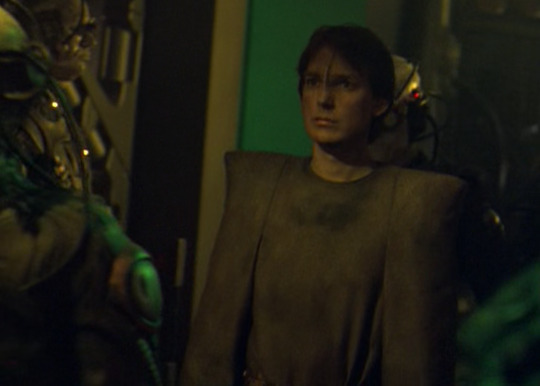
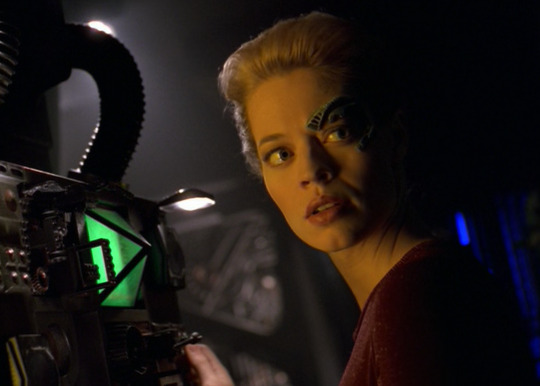
She looks haunted, but the explosions and sparks jostle Seven back to the efficient Drone mindset and she walks toward the malfunctioning area to try and fix it until she's thrown onto the floor. And healed in a very brusque manner by fellow drones, and you can see Seven's confused state. She doesn't know whether to be afraid or take it as given.
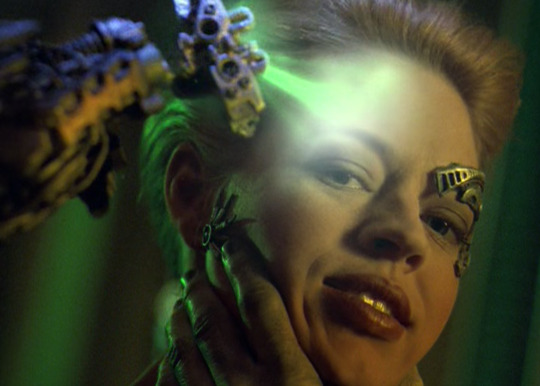
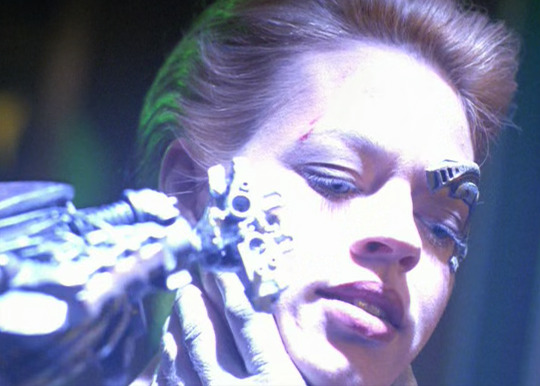
You can see Seven think: Oh. If I'm not critically injured, they heal me. But the experience clearly shook Seven and she stumbles back, and tries to go somewhere.
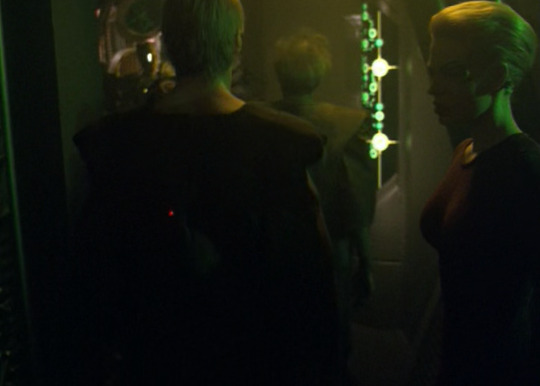
And runs right into another group of people forced to march to assimilation chambers.
One man, who has a little fight left in him tries to escape and runs right into Seven, who automatically, with her Borg-enhanced arm catches the man.

Even Seven seemed shocked at what she did.

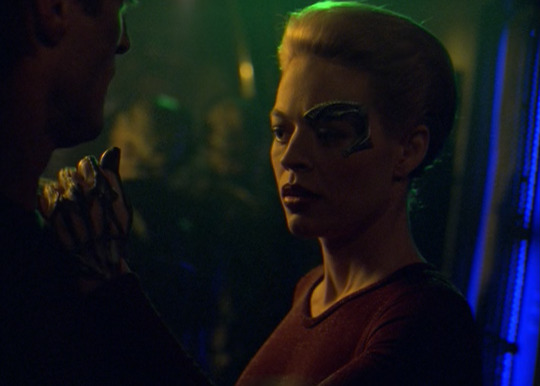
Seven releases the man:

Too late.
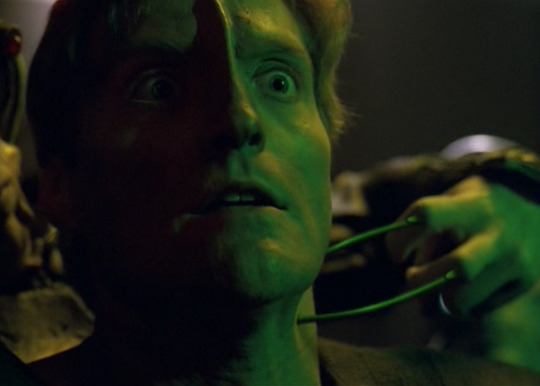
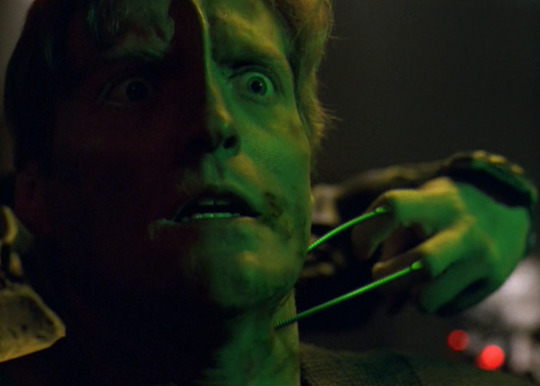
He's immediately injected with nanoprobes.
(Side note: I just realized this effect is very similar to the effect in Picard s3-- which makes sense because the Borg Queen's plans there were actually hatched partially in this two-parter!)

Seven is so horrified with what she's done, she staggers back. Again, a beautiful call forward to the moment Seven staggers back when alt!timeline!Borg Queen calls for her in Picard s2.
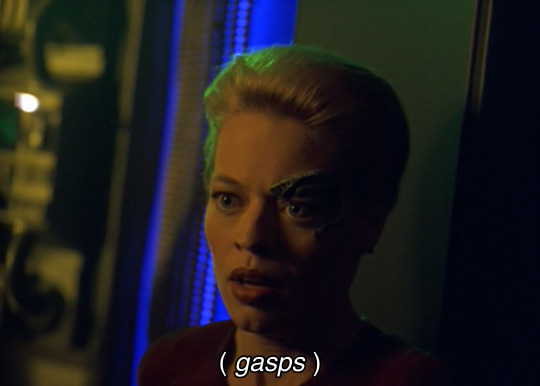
This is Seven's impetus in trying to help, if not all but at least someone.

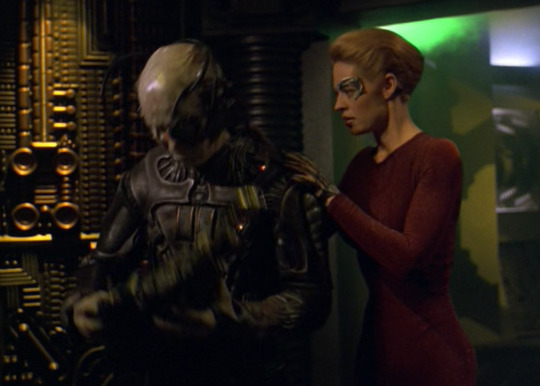
And the first time when Seven vehemently denied she was Borg:

Thus starts Seven lifelong struggle between her two identities- Borg and Human.
The questions about who she is is something that will plague Seven from the Delta Quadrant to the Alpha Quadrant. Picard s2 implied she was at peace with who she is but progress is not linear and I hope it's a question she's still struggling with (if we get her show).
#thinky thoughts#meta: voyager#star trek voyager#dark frontier#star trek picard#picard s3#seven of nine#the borg collective
37 notes
·
View notes
Text
As I scream into the void seeking a Narek RPer to play against, I have finally caved and must explain why I want this Romulan loungelizard to be more popular. (It won't happen, but I can dream.)
Reasons I like Narek as a character that nobody but me gives a shit about:
Let me preface this with a fact about me: I know Romulans.
I've RPed as Nero for almost two straight years in a large game. I've basically learned Rihannsu back to front for the endeavor. The person who played my Ayel and I both dumped countless hours into developing grammar and extrapolating cultural rules. We were dedicated to making them as believeable and accurate to canon as possible.
I have the whole timeline of the destruction of Hobus/Romulus down to memory. I know about all the neat little tidbits and trivia from comics and adjacent materials etc, etc.
This is to say: I have read and written quite a lot about Romulans in my time. I am very familiar with how they work and what data is available to draw from when writing them.
We do meet a few rank and file military Romulans from time to time, however. So we know how the general military operates in direct contrast to the Tal'Shiar. Caution and secrecy is sort of baked into their culture, which makes a lot of sense given that they're constantly at war with basically everyone, but they aren't (generally) unreasonable people.
In canon Trek, Romulans are often a little over the top with the sneaky-backstabbing-untrustworthy-nonsense. They're almost comical with how much scheming they do, but most of the Romulans we meet in canon are Tal'Shiar. The Tal'Shiar are known, pretty explicitly for the depth and breadth of their sneaky-backstabbing-untrustworthy-nonsense. It's kind of their whole deal, apart from mnhei'sahe (literally the ruling passion honor).
Narek, however, was a child when Hobus went supernova. He is from the very last generation that had any living memory of Romulus. (Elnor is also from this generation and they are great foils for each other, but that's another essay.) Narek is from a (presumably) respected family of--if not Tal'Shiar then Military--operatives. His aunt held high rank, his sister did as well, and both were inducted into the Zhat Vash, an organization that worked so quietly and efficiently that even the famously paranoid Tal'Shiar thought they were a myth. They orchestrated catastrophes and manipulated Galactic law to their ends, one of their members was the head of Starfleet Security and Narissa was on a personal basis with her.
Their underlying culture is present, but it isn't explored very deeply in any one canon source. Taken collectively, however, it is just as substantial as Klingon Battle-lust or Ferengi Capitalism.
Nero was a break from the norm, not because he was vengeful, but because he was the first non-military Romulan we'd ever really seen. His designs, the tattoos, the crew of his ship with their very un-Romulan loyalty, the way he talked and sought equivalent exchange of lives (mnhei'sahe), was a wealth of Romulan culture that we hadn't ever seen. He was a regular Joe, had a regular non-Military job, trusted and worked with aliens to try and save lives. His failure (not his fault) was something he absorbed and sought to rectify in the Romulan way.
Nero was super interesting both for how much detail he cast on Romulan culture, and in how he slotted into the Prime Timeline. Nero was a guy desperately clinging to hope, to the last vestiges of his civilian life, but he was cut free by the destruction of Romulus and set adrift. The only anchor he had in the AOS timeline was his honor and the driving need to balance the scales and restore it.
Narek, however privledge his family was, was a washout. He was a failure. We know he wasn't Zhat Vash, and whether he was even Tal'Shiar is up for some serious speculation. He doesn't act like military officers, and only seems to be play-acting as a Tal'Shiar, miming his sister when it suits him.
Narek may have had authority on the Artifact, but it was probably by dint of Oh granting it. We never get any clarification whatsoever about his rank or dayjob, just that he is fully devoted to helping the Zhat Vash. He is analytical, prepared, but he is not good at thinking on his feet and clearly does his planning off screen. He's meticulous but not especially skilled at hiding or regulating his emotional state. He is far less aggressive and stalwart than just about every other Romulan we've seen...except for Nero.
He was literally a placeholder sent to keep tabs on Soji. He didn't even arrive until Narissa had failed to capture Dahj. That Narek managed to get close to Soji, that he discovered her dreams and correctly surmised what they are, was more luck than skill. Before his assessments the Zhat Vash knew that Dahj (and Soji) could be activated out of their cover, but they assumed that they could capture them. They probably assumed they could torture the data out of them, if not dissect them and rip out a harddrive.
Narek found an easy way to get right to the information they needed. His attachment to Romulan culture is his puzzlebox--Before Nero we had never met a Romulan civilian and before Narek we have never met a cultural Romulan who plays with a toy, we had never seen a child's toy like that. Of course, the puzzlebox (Tan Zhekran) was a mechanism to illustrate his thought process, to make the differences between Narissa and him very apparent, but it was also something from his childhood (presumably). It's a weirdly personal affect for a Romulan and he fidgets with it almost constantly. It's a tell, something he shouldn't have, and it makes him accessible on an emotional level.
Narek is a civilian.
He's a civilian in a family of spies and operatives, raised alongside his sister on the same stories, with the same care. There's no way a Zhat Vash didn't have a family home on Romulus. While Elnor is a nice example of the new generation of Romulans, Narek is one of the last examples of what is used to mean to be a Romulan. He saw Romulus and escaped with all his surviving family when it as it was destroyed. Narek was raised on Romulan tradition (private names for family), Romulan stories about the end of the world, and he is haunted by them because he knows they're true, they're real. His sister and aunt have seen it, seen the message that drives people mad, about Ganmadan. His living relatives have dedicated their lives to preventing it and, even if he isn't actually Zhat Vash, he does the same.
Narek is a failure, by his culture's standards, by his family's standards, but he is also the only one of them who lives in the end.
He's a civilian who is trying, desperately, to avert another Romulan apocalypse. He has already lived through one and somehow this next one is even worse. Like Nero he sees the writing on the wall--but instead of doubling down on the traditional sneaky spy shit, he tries something new--unlike Nero, it works! He makes headway where nobody else could.
Unfortunately, it's kinda fucked up, but he then gives up everything in the pursuit of this goal. (Which to him, seems like a noble one.) Narek gives up who he is (by playing at being Tal Shiar), his safety (he has no idea what Soji is capable of or what might set her off, they only have records of Dahj killing a dozen agents before being blown up), and eventually resigns himself to killing the woman he's fallen in love with (the baseline requirement for giving out his real name). He does it all for the greater good, to save people and he doesn't seem to make much of a distinction between Romulan and other organic lives. He has his little plans, tracking La Sirena in a single cloaked ship, hiding his presence to tail them, firing on them despite being wholly outmatched, allying with Sutra however temporarily, trying to sway Soji again, turning to Rios, Raffi, and Elnor for help--he's willing to do anything because he's terrified that everything is about to end and it will be him who failed to prevent it.
The very last shot we see of him, after his plan to detonate the transmitter fails completely, is him on the ground being dragged away by the Coppelius androids. He doesn't posture or threaten, doesn't say ominous shit like the other Romulans we're used to--He begs. He claws at the ground, trying to stay, and he begs. He pleads with Soji, calls her his love, tries that last ditch hail mary because it's all he can do. He fails his task and she's the last person he can reach out to and, in the end, despite the very real threat to her life, Planet, and Picard, Soji smashes the transmitter. The apocalypse is averted.
Narek failed but he also succeeded. His aunt is dead, Oh has been outed as a traitor, and his sister is killed by Seven of Nine. In a cut scene, apparently, Narek was supposed to be arrested by Starfleet. So he's facing (at the very least) retribution from the androids and the ExBorg. Starfleet is very likely to arrest and interrogate him, if not imprison him indefinitely since he has ties to the Zhat Vash and, subsequently, will be on the hook to explain the Utopia Planetia disaster. Soji hates him, for good reason, and his homeworld is long gone. Narek has nothing...but the world was saved.
Narek is singular because he's all about needing and interacting with other people, he has no real authority, nobody he commands. He's a civilian (insofar as any Romulan can be) and is a soft, emotional boy who hangs on to his childhood toys. He's driven in equal parts by fear and a deep sense of failure, like everyone else in the show, and he takes the steps that seem right and necessary to him (also like everyone else on the show).
Narek was a great contrast against Elnor in every possible way--from his evasiveness to his fear of death--and he was a great foil for Soji. On Coppelius, Soji's terror clouds her judgment and she very nearly does terrible things to protect herself. Her actions, her opinions, her hesitation were all driven by fear. The ends seemed to justify the means. She reflects Narek's state for the whole show. Season 1 is about finding safety and meaning.
Narek is afraid for the whole duration of the show and his choices all reflect that same desperate need to find permanent safety, to live. Soji exists on the peripheral of that with the Ex-Borg, and as a synthetic, and then she falls headlong into it after his betrayal. Narek regrets trying to kill her and the symbolism of his losing that box, of him trying to kill her in a room that is so very culturally Romulan, right after telling her his name, makes it very clear that killing her is killing some piece of himself. But the ends justify the means. He can and will give up everything to save the world.
And his last line in the show is desperately pleading with the woman he loves as he's dragged away.
Then we never see him again or get anything resembling closure for Soji or Narek.
Which I will be big mad about forever, because they didn't even get the bare minimum acknowledgement and closure of "moving on and living life is paramount because it is finite and beautiful ". Nope. Nothing. I'm furious forever.
Thank you for coming to my TED talk. I hope if Star Trek Legacy happens we get Narek as a sort of...side character creeper informant ala Garak. I also hope we get Soji on Seven's Enterprise because I love her.
#Star Trek#Star trek picard#picard season 1#soji asha#soji#narek#elnor#picard#Nero (Star Trek)#AOS related musings#romulan star empire#romulans star trek#romulan#romulans#if anyone needs a full romulan dictionary hit me up#Mnhei'Sahe is the concept of honor tied to the foundations of yourself where 'failure' is akin to dishonor and righting the scales is#the number one priority regardless of what atrocities must be committed to accomplish it.#Nero was a failure and had to destroy Vulcan and Earth to equal the lives on Romulus - equivalent exchange#Narek is a failure who has no cultural capital to spend outside of his own life and safety and spends everything he has without hesitation.#Soji needs better taste in men but I still ship it#in this essay i will#Not rp#character meta#ooc post
23 notes
·
View notes
Text
The Anatomy of an Outfit (aka 'holy fucking Continuum THE LOOK™)
Y'all know I haven't seen a single STP episode since 2.9. I would rather gargle with acid than go near this show ever again frankly, but, well...
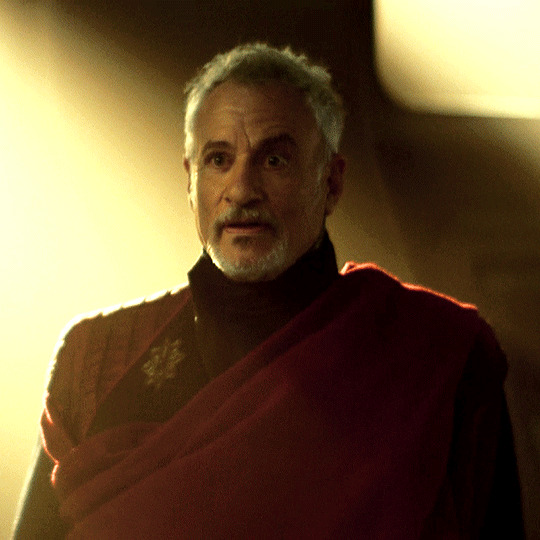
... Good sweet sanctuary what the fucking hell is THIS. :O (@tennant, clearly a fellow appreciator of all things ancient god, must be thanked profusely for these glorious few shots I'm about to show off. <3)
I called this lovely, lovely man returning about ten minutes after he 'died', but I don't think any of us were expecting his outfit to slay THIS HARD when he did. And not only is it the sexiest thing my fortunate eyes have ever had the pleasure to absorb, but it also happens to be very, er... well let's be real here, it's ridiculously Qcard-coded.
Let's break it down, shall we?
We'll start with the obvious: it's maroon and black. This look appears to be a mad fusion of his Encounter at Farpoint judge robes (which is fair, we end as we begin), and his husband of forty years' captain's uniform. That piped shoulder's hugely reminding me of this, in fact:
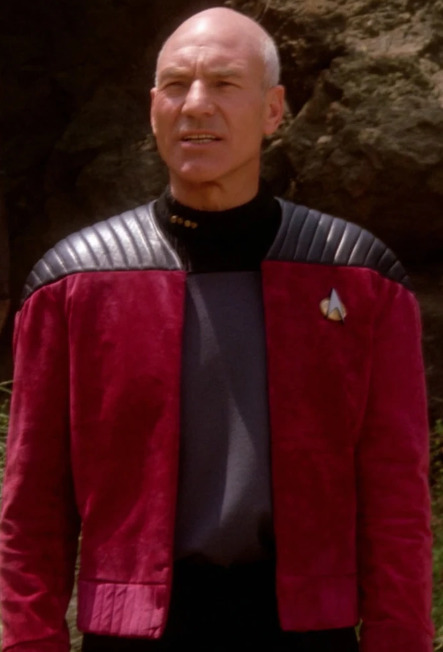
It's the inverse! You know, the same look, flipped? Because they have perfectly distinct personalities but are also mega gay???? Costume department allies fr.
The delightfully dramatic sash Q's rocking is also interesting - it places maroon at the centre of the outfit, and is its grandest statement, which makes it an excellent example of the importance of the colour to its wearer. This is the clothing equivalent of him having mon capitaine tattooed across his essence, which... well yeah, valid. Canonical facts. It's worn across virtually his whole chest, too, because nothing says 'that's my husband' more than having him literally held against your heart.
It's a different era of captain, across two shoulders - the old teasing, and the new love.
Also, this fucking brooch.
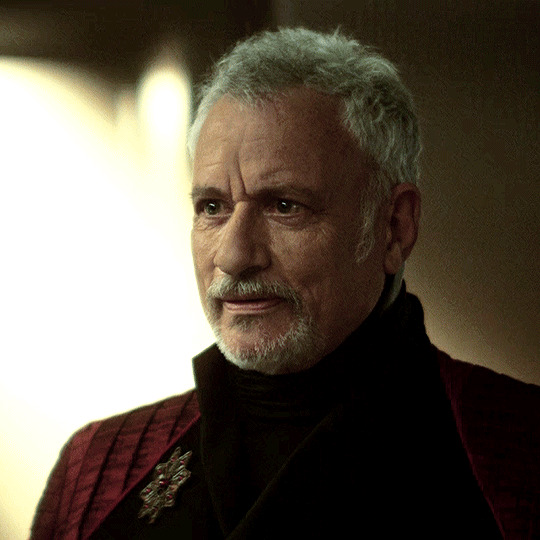
Now, whilst I doubt they've given even John de Lancie a piece made of actual rubies for a fifteen-second scene, the stones here are very clearly meant to evoke them. And rubies are interesting for several reasons:
They're Picard's birthstone, his birthday being July 13th;
They're symbolic of power and protection. What follows is some of the interesting info I've picked up from internet gemology on rubies:

... Huh. Resolve disputes. 'Dispel anger,' when we've seen a darker Q in this series. And 'protective powers'... mm, how many times has Q saved Picard's life again? What did we get up to, six?

... 'Romantic love.' 'Devotion.' Uh-huh.
This brooch is also evocative of the Navaratna, or this thing:

The brooch itself is clearly stylised, but it features eight gems orbiting a central larger ruby (which is meant to be the sun by the way, as though this motherfucker wasn't already evocative ENOUGH of the sun here or here), and is an important cultural and religious symbol in Hinduism. What's it symbolic of, exactly?
... Oh, nothing much. Just... just this.

... Like I said, nothing much, just the whole concept of Qcard in fucking jewellery form.
The brooch's also, as the wife @porgthespacepenguin pointed out, an eight-pointed star.


... Have I mentioned yet that I fucking detest this show? Because I really fucking detest this show.
There's nine rubies on it, as well. Picard's in his nineties.
So, let's recap:
Nine of Picard's birthstone for his ninety years
Sun symbolism, AGAIN
Celestial relationships
Beyond space and time
Romance
Prosperity
Protection
Resolution
So, all that, from a brooch worn over an outfit that looks suspiciously like Picard's, which has a sash across it in Picard's colour.
... And I'm supposed to believe that Qcard isn't endgame? You're really going to gaslight me to this degree right in front of my salad, you absolute bastards????
Guys, when you inevitably wipe this shitshow of a Star Trek from your collective minds like I'm about to do, just... take this with you. Take the fact that everything about this outfit and this SHOW has said all along that Qcard is endgame, until they couldn't be arsed. Until they lost their balls for the pathetic few who might have naysayed it.
Patrick, and certainly John, deserved so much better. I'm glad that at least someone on this set understands that. (I see you, costumers. I see you, and I love you.)
Just going to... just going to stare at the absolute fine-aged wine of a man that is John de Lancie for a moment, before I lose my whole shit. He calms my soul, you see.

HIT THE SLAY KING JOHN <3
#qcard#q of the continuum#jean luc picard#just gonna throw in here again that I DETEST THIS SHOW WITH EVERY FIBRE OF MY BEING thank you for listening#can't believe love won guys even if no one actually bothered to tell us#they're married now and everything#star trek picard spoilers#stp#meta
108 notes
·
View notes
Text
Some thoughts on Picard Season 2 and why it's unpopular.
So I had a bit of an epiphany yesterday. I'm rewatching Picard Season 2 in preparation for a discussion about it with a colleague next week and I was constantly reminded that a lot of fans are very visceral in their dislike of this season.
To be honest, there are parts of it that I don't like. I think the whole Soong/Kore story was a totally unnecessary distraction and was only done, once again to shoehorn in Brent Spiner and the Picard/Data relationship - which I never found compelling in the first place. But that's just me.
However, I realized that Picard Season 2 does something that no other season (or show) of Star Trek does, it centers the entire narrative on humanity. By making the protagonists AND the antagonists humans, there is no subtle (or not so subtle) use of alienation to map contemporary adversaries or conflicts onto the Federation's adversaries. This is important, because, as I have argued in a multitude of research papers, Star Trek is very, very guilty of framing future conflicts through the lens of contemporary adversaries. This was done very explicitly in TOS - both Roddenberry and Coon overtly asked for the Klingons to be modeled on an "Asiatic Communist" trope. Communism was again the enemy in TNG, through the medium of the Borg and "assimilation" and loss of individuality. DS9 has its Cardassian "Nazis"; Voyager and Enterprise the chaotic post-Cold War existential threat of non-state actors and by the time we get to Discovery, the Klingons have been recast as Jihadist extremists.
The fundamental problem with this is that no matter how much Star Trek might talk about the Federation being a "future better us"; by casting recognizable real world adversaries as the Federation's foes, it automatically casts the contemporary US as the Federation (that's just how TV works, especially through the manichean lens of US culture).
So, if you don't want to think too hard about the ways in which the US interacts with the world. If you don't want to think too hard about American exceptionalism and Neo-imperialism and the misuse of force (and capital) without and within the US. If you cloak it all in the surface progressiveness of visible diversity - and I'm not claiming that diversity and representation isn't important, of course it is, but diversity does not equal progressive politics - then you can happily watch Star Trek without ever having to grapple with the uglier parts of the American experience. If we are the Federation, and clearly we must be because the Federation's foes are recognizably our foes, then we are already the galaxy's "good guys"; the Federation is just a future extension of the American now.
Season 2 of Picard blows that all apart. The bad guys are the Confederation and, by going back to the 21st century and exposing the roots of the Confederation in all the ugly, racist, greedy, unequal, venal, corrupt layers of 21st century America, the Confederation is a direct consequence of that present (our present) being allowed to play out into the future. We are the enemy in the 21st century and we become the enemy in the 24th century.
And the show pulls absolutely no punches. We get ICE brutalizing detainees and explicit discussions of people being disappeared because they are dehumanized as "non-people". Homeless encampments and immigrant clinics amid glittering towers and sumptuous parties. We get quips about the ridiculousness of pledging allegiance to a flag (thank you Ríos) and monologues about exchanging white hoods for suits (thank you Guinan). Some of the despair is directed to the behaviors of everyone on the planet - climate change - but the vast majority of the political commentary is explicitly about the contemporary US.
Not only that but it's done by a diverse cast that speaks Spanish, and is brown and queer and female and empowered (thank you Queen Agnes) and where the only white men are aging and feeble.
It is (the wandering Soong/Kore storyline notwithstanding) fucking brilliant television and it's the first time that Star Trek is ever explicitly - textually AND subtextually - progressive. There is no ability for the audience to elide the message by hiding in the fiction that we are the Federation and THEY are the bad guys (the Klingons, the Borg, the Romulans, the Breen, the Cardassians).
So no, let's get rid of the bullshit that people don't like Picard Season 2 because of "the writing", the writers room for Seasons 2 and 3 is almost identical (Matalas, Appel, Monfette, Maggs and Okomura) and the writing for both seasons was taking place almost at the same time.
Whether it's subconscious or not, the disproportionate degree of hate leveled at Season 2 (often by the same fans that love season 3 for it's "great writing" and overt nostalgia) exists because the storytelling in Season 2 leaves fans no place to hide. Because for the first time Star Trek really dives into the core of science fiction, which, as many, many sci-fi writers have explained (Margaret Atwood most recently), is not to predict the future but to critique the present.
I may come back and edit or extend this later, but right now I'm going to leave it as is and post.
Edited to clarify that you can hate Season 2 for any reason you want to, personal taste is just that, personal - but the (for the first time) explicit social commentary cannot be divorced from the unusual levels of vitriol hurled at this season by a substantial group of very vocal fans.
48 notes
·
View notes
Text
Seven of Nine’s journey through the cosmos isn’t just about exploring new worlds; it’s also about discovering her bisexuality, as seen in her heartfelt relationship with Raffi Musiker in "Star Trek: Picard." #BisLoveSciFi 🚀
#star trek#lgbt#queer#bisexuality#bi#lgbtq#lgbtqia#bi visibility#bi pride#representationmatters#bivisibility#sci fi#sci fi and fantasy#star trek picard#seven of nine#scifi#science fiction#outer space#star trek voyager#star trek meta#star trek fanart#star trek art#trek#star trek memes#bisexual
11 notes
·
View notes
Text
I saw a critique of Picard season three put forward as "a story about how only boomers can save the day from the bad thing," and... I can see it, I'm not saying that it's an invalid critique, but at the same time, I don't think it's altogether fair.
Like, for one, I feel like if there's any age-based or generational-base of the storytelling, it's in the realm of "being old does not mean you have nothing to contribute." Which is kind of a big deal when most of the time in media, you see Hollywood specifically trying to draw in and appeal to the demographics of youth, to hook them in and hold them for life. Meanwhile, Picard centered on a character in his nineties played by an actor in his eighties, and aside from Jack Crusher and Sidney La Forge, every major character and actor in the season was older than forty, at least, with the TNG cast all over sixty, with only two under seventy.
It's a pretty big deal, especially when you remember that the last time that Star Trek was directly addressing the aging of its cast, the characters involved were in the fifty/sixty range, and talking like they were near the end of their years of being able to contribute something, that they'd come to the end of their road and were just going to fade away soon after. So while the TNG characters weren't necessarily on the front line and acting as line officers, doing the day to day field work, they were also very clearly shown as being able to contribute to the world they lived in, being able to make the difference.
Plus the framing of Seven of Nine, I feel, makes a refutation of the idea as well - she is, despite being a returning character we the audience already knew, at the head of the "new generation," we see that throughout her framing, particularly in her relationship with Shaw. Not just with her advancement to captain, but also in particular in that last message from Shaw in the finale, where he acknowledges that he's representative of the old ways standing in her way and that if she's writing a new book, it's because the old one needs to be rewritten.
Now, maybe you could look at this in like a "boomers versus millennials/Gen Z" thing, but - and maybe it's just my general trend towards optimism, particularly in my Star Trek - but what I see is NOT generational conflict, but more of a call for generational UNITY. Y'know, the first half of the season, we saw how Sidney's faith and trust in Seven helped save the Titan, because she respected Seven to call her by her name, stopping the infiltrator. Although it was part of the Borg hijack, Jack's connected nature helped to save the day multiple times. And Seven also trusted that Picard and crew could do something against the Borg.
Hell, I could even take this further, and call this a metaphor AGAINST generational conflict, that it's saying that others will try to use generational differences to divide and disrupt, and we need to overcome that - this is something I KNOW I've seen talked about plenty on Tumblr, how we have all this stuff trying to pit millennials and Gen Z against one another, in the same way that millennials and the baby boomers are. That this is an effort by the forces of power (power that goes beyond generation) to keep the masses divided against one another so that they aren't a threat to that power structure.
Because sure, the Supercube and the Borg Queen were destroyed by the TNG crew flying in and saving the day, but Seven and company retook the Titan and held off the assault on Earth long enough that they could do that without Earth and the Federation falling, and a major point is that Jack had to CHOOSE to leave the Collective, that it had to be his decision. Everyone had to work together for that happy ending, rather than alone.
Maybe I am being overly optimistic and taking the best faith interpretation at the expense of something else being involved and at play... But then, isn't that something that Star Trek has always tried to ENCOURAGE, to believe the best in things?
72 notes
·
View notes